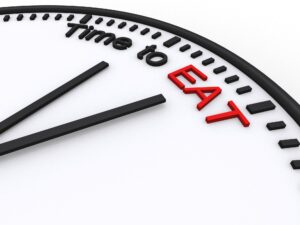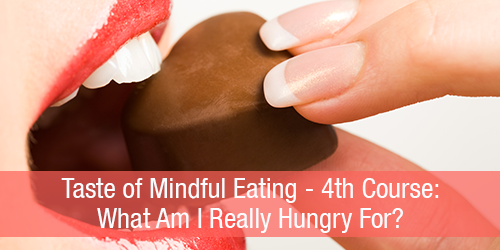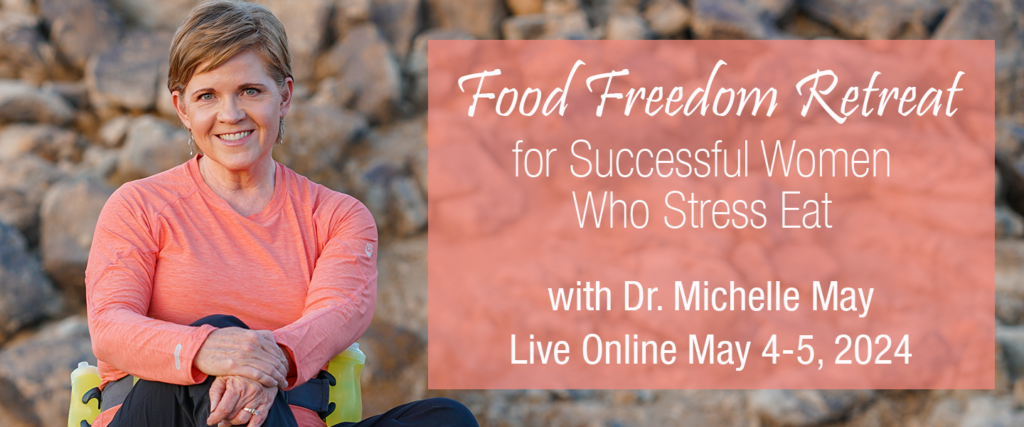In this 4th Course of Taste of Food Freedom, we’ll begin to explore reasons you eat when you’re not hungry: What Am I Really Hungry For?
Recognizing Head Hunger
Do you sometimes confuse “head hunger” with physical hunger?
There are hundreds of physical, environmental, and emotional triggers for eating when you’re not hungry. One of the essential steps to food freedom is to start recognizing these triggers and break the associations that lead you to eat out of habit.
Let’s look at just a few of the many common triggers for overeating and strategies for coping more effectively.
It’s About Time
 Society programs you to eat on a schedule. So like Pavlov’s dogs, you may have learned to salivate when the “bell” rings. One of my clients calls it “lunch o’clock”!
Society programs you to eat on a schedule. So like Pavlov’s dogs, you may have learned to salivate when the “bell” rings. One of my clients calls it “lunch o’clock”!
The reality is, it’s often more convenient or even necessary to eat at certain times. With awareness of your natural hunger rhythms, you can adjust when, what, and how much you eat so you’re more likely to be hungry at your mealtimes.
As an example, let’s say you’re often overly hungry at your mealtime and end up overeating.
You could try some experiments:
- What happens when you eat different types of food, like more protein, at your earlier meal?
- What if you plan for a small snack an hour or two before your meal?
- Is it possible to move your mealtime up?
Sweet Temptation
Most people are “food suggestible.” Seeing displays of food like candy or nuts in dishes and tempting foods when you open your cabinet or refrigerator can trigger you to want those foods.
Remember, out of sight, out of mind!
- Avoid using food as decorations or leaving appetizing foods laying in plain view.
- Try putting tempting foods behind other foods in your cabinets and refrigerator.
- If a co-worker keeps food out, politely ask them to keep it in a drawer instead.
Forbidden Food
The mere thought of a diet can trigger feelings of deprivation and cravings and has been shown to increase food intake.
- Cut down on the amount of time you spend talking about food, weight, and dieting.
- Learn mindful eating strategies to make decisions about eating without restriction, deprivation, or guilt.
What’s Eating You?
While emotional connections to food are healthy, emotions are also common triggers for overeating.
Stress, boredom, anger, anxiety, and other feelings are ways your body communicates with you to let you know you have a need.
Since food doesn’t meet your emotional needs very well, those unmet needs tend to trigger eating again and again!
- Remember, eating to cope with your emotions disconnects you from important information and interferes with your ability to discover and satisfy your true needs.
- Once you’re able to identify the emotions that trigger the urge to eat, you can learn more effective ways to comfort, nurture, calm, and distract yourself without turning to food.
Food for Thought
Take a few moments to consider your answers to the following:
- Write down at least three of your triggers for overeating.
- Next, write down at least three possible strategies for dealing with each of your triggers.
- Make sure your ideas are practical and appealing.
- Experiment with one of your ideas the next time you become aware of a trigger.
Recipe for Success
- Make note of the times you confuse physical hunger with “head hunger.”
- When you recognize an urge to eat was caused by a trigger rather than true hunger, see if you can identify the specific cause.
Hungry for More?
Congratulations! You’ve experienced four small tastes of food freedom.
I hope you’re started to realize the potential impact of relearning to trust your body wisdom and how important it is to address your other triggers for eating.
I know you’re experienced enough to know that there’s no quick fix.
However, if you’re inspired to take a deeper dive into this anti-diet approach to your eating, please click here or on the graphic below to learn more about the upcoming Food Freedom Retreat for Successful Women Who Stress Eat.
How about some dessert?
What would a four-course meal be without a little dessert at the end?
Since you probably have questions about what you’ve learned during the Taste of Food Freedom, you’re invited to join me for a Group Coaching session to get your questions answered and receive coaching about your eating challenges!


